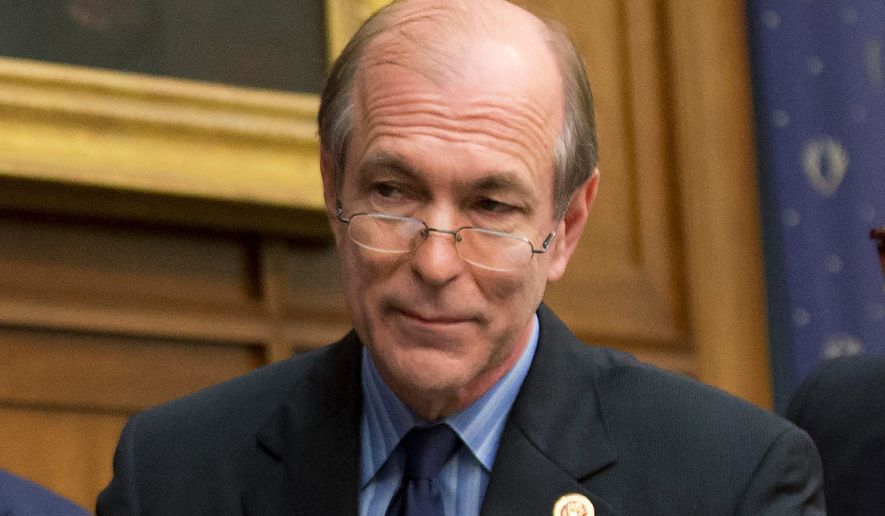Rep. E. Scott Garrett easily won re-election in campaign after campaign, but the New Jersey Republican is now in one of the toughest House races of his career after he drew the ire of the gay rights movement, which has spent heavily to oust him.
Mr. Garrett reportedly refused to pay dues last year to the House Republican Campaign Committee because it had supported gay candidates — costing him some of his own donor support and sparking an outpouring of cash to his Democratic opponent, Josh Gottheimer, who was a speechwriter for President Clinton.
Now prognosticators say Mr. Garrett’s race is a toss-up — one of fewer than 20 highly competitive races this year, and a surprising place to be for a man who has won his seven elections with at least 55 percent of the vote.
It is among several down-to-the-wire races testing the sizable Republican Party majority established in the tea party wave of 2010, as unsettled voters seek to remake Washington in an election cycle featuring unpopular ticket-toppers in Republican presidential nominee Donald Trump and Democratic rival Hillary Clinton.
Political analysts say Republican incumbents who normally would cruise to victory face tight races in districts where their support from Mr. Trump hasn’t always jibed with their district’s leanings.
That includes Rep. Darrell E. Issa of California, who is struggling to fend off retired Marine Col. Doug Applegate north of San Diego, though early voting has tilted Republican, and Rep. Kevin Yoder of Kansas, who is locked in a tight battle with Democratic recruit Jay Sidie in a district that includes Overland Park and the Greater Kansas City area, though the Republican holds a large cash advantage.
Rep. Barbara Comstock, Virginia Republican, is battling the Trump effect in her Northern Virginian district after cruising to easy election in 2014. On Tuesday, the National Republican Congressional Committee turned the tables and said her opponent, Democrat LuAnn Bennett, should answer for the ongoing FBI probe into Mrs. Clinton’s private email server at the State Department.
House Democrats need to swing 30 seats to take the majority, an uphill climb made steeper by challenges of their own in northern Minnesota, where Rep. Richard M. Nolan faces a stiff Republican challenge from Stewart Mills in a working-class district that might find Mr. Trump’s trade rhetoric appealing.
In New Jersey, Mr. Garrett has taken a mixed approach to Mr. Trump, condemning his caught-on-tape remarks about women from a 2005 Access Hollywood taping but saying he would vote for the Republican presidential nominee.
That won’t sit well with some Bergen County voters in the eastern part of the district, but it could solidify support in Sussex and Warren counties to the west, “which more nearly resemble Kansas than they do the other 19 counties of New Jersey,” said Ross Baker, a politics professor at Rutgers University.
Those rural counties — plus parts of neighboring Passaic County — are Trump hotbeds, so Mr. Garrett may “withstand the assault,” he said.
Yet the congressman’s main stumbling block is of his own making. Politico last year reported that he told Republican colleagues behind closed doors that he refused to pay dues to the National Republican Congressional Committee because it had supported gay candidates.
Mr. Garrett said his stance has been misconstrued and that he wanted the committee to back only candidates who agreed with the Republican Party’s long-standing platform defining marriage as a bond between a man and a woman.
Yet the damage may already be done.
“Wealthy gay men in New York have lavished money on Gottheimer,” Mr. Baker said.
Mr. Gottheimer had raised $4.3 million as of the most recent campaign finance reports, more than twice the $2.1 million Mr. Garrett raised this cycle. Mr. Gottheimer also had nearly $2 million in cash on hand as of Oct. 19, compared with $1 million for Mr. Garrett.
Mr. Gottheimer has tried to shirk labels in the race, casting himself as someone who is fed up with partisan bickering and who has the professional background to get things done. His resume includes work for Microsoft, Ford Motor Co. and the Federal Communications Commission.
“I’m not, frankly, running as a Democrat or a Republican. I’m running as somebody who’s here for the 5th Congressional District, because we need somebody who’s going to stand up for us again,” Mr. Gottheimer said at a forum hosted by WRNJ radio in northwestern New Jersey.
• Tom Howell Jr. can be reached at thowell@washingtontimes.com.




Please read our comment policy before commenting.